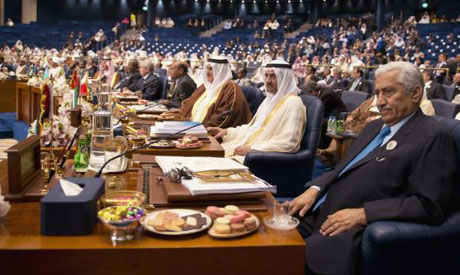
A general view of the closing ceremony of the 25th Arab Summit is seen in Bayan Palace,Kuwait March 26, 2014 (Photo: Reuters)
Arab leaders on Wednesday called for a political solution to the conflict in Syria, although the Syrian opposition had asked for "sophisticated" arms to tip the balance of power.
"We call for a political solution to the crisis in Syria based on the Geneva I communique," calling for a peaceful transition of power, they said in a statement at the end of a two-day summit in Kuwait.
The communique was drawn up at an international conference in 2012 in the Swiss city without the participation of the Syrian government or rebels.
The two warring sides met at so-called Geneva II peace talks which UN envoy Lakhdar Brahimi broke off on 15 February without setting a date for a resumption of negotiations.
At the summit on Monday, Syria's opposition National Coalition chief Ahmed Jarba repeated calls on the international community to supply rebels with "sophisticated weapons."
"I do not ask you for a declaration of war," said Jarba, urging Arab leaders to put pressure on world powers to fulfil pledges to supply arms.
Saudi Crown Prince Salman bin Abdul-Aziz, whose country is a key backer of the revolt against Syrian President Bashar Al-Assad, said the world was "betraying" rebels by failing to arm them.
The summit's final statement asserted the Arab leaders' commitment to back the Arab countries in transition as to allow them to "implement their political roadmaps and re-construct their institutions as to achieve security, political and social stability that will carry an impact on the Arab world."
According to the statement, the Arab countries are keen to enhance the "Arab national security in order to face the encountered domestic and foreign hardships."
The Arab League praised the recently-concluded national dialogue in Yemen, rejected intervention in the country's internal affairs and hoped for the establishment of a political system based on "wise governance." The statement expressed support to the Yemeni state in its "war on terrorism."
Moreover, the document claimed the rights of the United Arab Emirates' (UAE) sovereignty over the three disputed islands with Iran, calling the latter to respond to the UAE initiative for reaching a peaceful solution through direct talks or seeking the arbitration of the International Court of Justice (ICJ).
Concerning the situation in Sudan, the statement called the international community to fulfil its financial promises towards the country, accentuating support to the implementation of Khartoum's agreements with South Sudan.
The Pan-Arab organization condemned the "terrorist operations" of Somalia's Al-Qaeda-linked Al-Shabaab rebels against civilians and the African Union's AMISOM force battling the militant group in Somalia.
The statement concluded by calling for the Middle East to be emptied of weapons of mass destruction, urging for an international conference on the issue to be joined by Israel and ending the "arms race" in the region.
Short link: